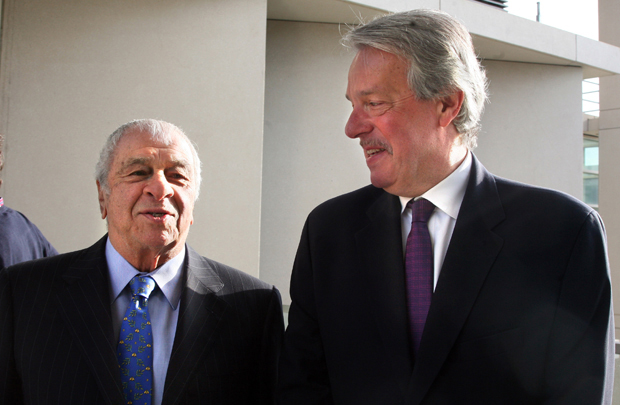According to the Alzheimer’s Association, an estimated 5.2 million Americans have Alzheimer’s disease; by the year 2050, the number could triple unless developments in medicine can slow or reverse the pace.
Researchers, clinicians and students gathered at USC on April 4 to learn more about progress in prevention and treatment at the 1st Annual Zilkha Symposium on Alzheimer’s Disease & Related Disorders.
Berislav V. Zlokovic, MD, PhD, director of the Zilkha Neurogenetic Institute, part of the Keck School of Medicine of USC, and the Mary Hayley and Selim Zilkha Chair for Alzheimer’s Disease Research at USC, noted that the symposium was unique due to its overarching look at the disease.
“Breaking through Barriers: Neuronal, Glial and Vascular Contributions” featured lectures on several contributing factors, including: genetic, vascular, inflammation, astrocytes, neurons, and brain mapping.
“I can’t think of another topic that fits so squarely across convergent science in basic science and medicine, informatics and health across the lifespan as Alzheimer’s disease,” said Michael Quick, MA, PhD, executive vice provost and professor of biological sciences at USC, during his opening remarks. “Alzheimer’s is a critical problem for society. We will have to innovate the best we can to find ways forward with this devastating illness.”
USC speakers included Zlokovic; Hon-Wei Dong, MD, PhD, associate professor of neurology; Paul Thompson, PhD, co-director of the Institute for Neuroimaging and Informatics and professor of neurology; Arthur Toga, PhD, co-director of the Institute for Neuroimaging and Informatics and provost professor of neurology; and Terrence Town, PhD, professor of physiology & biophysics.
Helena Chui, MD, professor and chair of neurology, chaired the event along with Maria Carrillo, PhD, vice president, medical and scientific relations for the Alzheimer’s Association, and Roderick Corriveau, PhD, program director, extramural research programs for the National Institute for Neurological Disorders & Stroke.
The guest of honor was philanthropist Selim Zilkha, co-owner of Zilkha Biomass Fuels and a member of the Keck School of Medicine board of overseers. Zilkha’s mother and oldest brother both suffered from Alzheimer’s disease, sparking his interest in neurogenetic diseases and leading to his $20 million gift in 2002 to establish the Zilkha Neurogenetic Institute.
“I admire scientists. Unfortunately, I am not one,” Zilkha quipped during his welcoming remarks. “I will be 87 years old next week, and I have started many businesses in my life. My most important legacy will be the Zilkha Neurogenetic Institute. In the very beginning, we pledged to ourselves to find a way to prevent, arrest and reverse Alzheimer’s disease. Is it not important who of us succeeds in this quest, but it is critical that someone does.”
The event was sponsored by a gift from Eva and Marc Stern, and organized by Zlokovic and the Zilkha Neurogenetic Institute.
—By Amy E. Hamaker


